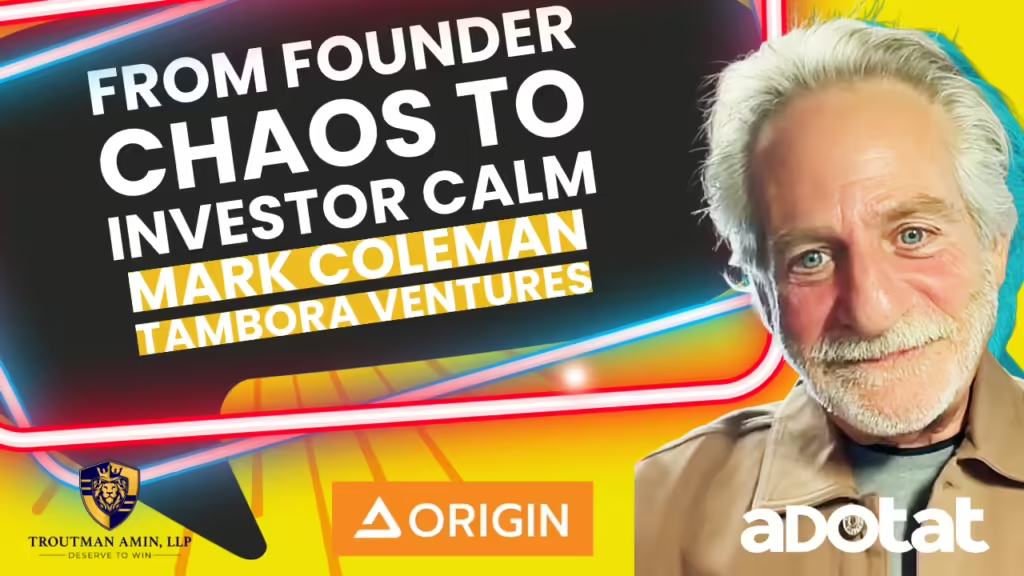Meet Mark Coleman, a venture capitalist who doesn’t give a rip about the traditional VC playbook. Management fees? Nope. Early exits? Not his style. And don’t even think about trying to impress him with your ping-pong table or kombucha bar. Coleman is part startup whisperer, part reality check artist, and all about cutting through the nonsense.
In an industry that loves to fawn over “disruptors” who usually end up just reinventing the wheel with shinier PR, Coleman stands out. He’s been in the trenches, sold DoubleClick to Google (no big deal, right?), and now spends his days mentoring entrepreneurs—often while politely telling them to focus on real problems instead of playing Startup Bingo with buzzwords.
Let’s dive in, because this guy is not your average suit.
From the Sweaty-Palmed Trenches to Investor Zen
“So you’ve gone from the ramen-eating, sleep-deprived startup life to the chill investor vibe, sipping artisanal coffee while watching others do the panic dance,” quips Pesach Lattin, kicking off their conversation on The ADOTAT Show. Coleman smiles, the kind of smile that says, “Yeah, I’ve seen some things.”
“We all have careers and paths we follow,” he says, with the serene tone of someone who’s done the 80-hour work weeks and come out the other side alive. Now he’s co-founder of Tambora Ventures, the man behind the curtain for startups looking to make it in a world that’s more likely to chew them up and spit them out than turn them into unicorns.
And here’s where Coleman’s journey gets interesting: he’s not in it for the cliché “giving back” storyline that investors love to preach. No, he’s in it because he genuinely enjoys seeing smart people solve big problems. “I was blessed to be around really smart people,” he says, “and now I’m paying it forward.”
When Founders Drive Into Walls, Coleman Hands Them a Map (Not a Helmet)
Now, if you think Coleman’s the kind of investor who’s going to put out every fire you start, you’ve got him all wrong. He’s not running a daycare for over-caffeinated founders. “We don’t wait for an accident to happen to put a stoplight at that corner,” Coleman explains, matter-of-factly. Instead, he’s all about stepping in before the flames start—because, let’s face it, by the time a founder is putting out fires, it’s probably too late.
Does he enjoy watching his protégés faceplant? Of course not. But he’s also not here to sugarcoat things. “I try not to own the car that they’re driving,” he says, which is basically venture capitalist code for: Your failures are yours to own, but I’ll help you avoid the worst of them.
Coleman’s not a fan of the last-minute rescue. In fact, he avoids the whole knight-in-shining-armor routine. “We like to get ahead of the curve,” he says, sipping his coffee, probably while his portfolio founders are downing espresso shots and praying they hit their next funding milestone.
Ping-Pong Tables? Please. Focus on Margins, Kid.
Remember those startups that spend more time deciding what color their office beanbags should be than on, you know, building a product people actually want? Coleman sees right through that fluff. “I bring it down to basic marketing 101,” he says, reminding everyone that building a business is about solving a problem—not winning the coolest office award on TechCrunch.
And here’s where it gets good: Coleman has a way of cutting through the noise that makes you wish more VCs did the same. “They didn’t go into this to be bankers, to be raising money,” he says, sounding almost exasperated. “They came in to be builders.”
You can almost hear the collective eye-roll when he talks about founders who obsess over branding before they’ve even figured out if their product works. “It’s all about the innovation. Taking it to market. Following their KPIs in the journey,” he adds, dropping business wisdom like it’s a TED Talk no one asked for but desperately needs.
No Fees, No Nonsense: Mark Coleman’s Unorthodox VC Strategy
Here’s where Mark Coleman breaks all the rules. In an industry that practically lives off of management fees—standard issue 2% for most VCs—Coleman just says, “Nah, I’m good.”
“I don’t charge a management fee for my LPs,” he says like it’s the most natural thing in the world, as if every other venture capitalist isn’t listening and clutching their pearls. Why? Because he doesn’t believe in taking money out of the ecosystem. He’s not here to play fund manager; he’s here to actually, you know, fund innovation.
“I thought the big bet was my vision,” he explains. “Let’s all make money together.” If that sounds almost utopian in the cutthroat world of venture capital, it’s because it is. But Coleman is clearly thriving. He’s already on his third fund, with partners who buy into his karma-fueled philosophy.
“I’m a karma guy,” he says, casually tossing out a sentiment that would make most financiers shudder. “I pay things forward… and I haven’t changed it. It’s been working, so it ain’t broke, I’m not gonna fix it.”
The Broken VC World: Coleman’s Not Here for Your Nonsense
If you’ve ever wondered what a venture capitalist who actually calls out the industry’s BS sounds like, wonder no more. Coleman pulls no punches when it comes to his thoughts on the state of the VC world.
“It’s a broken sector,” he says bluntly. “Sadly, a lot of bad actors on both sides.” He’s not just talking about shady founders fudging numbers to impress investors (although there are plenty of those). He’s also calling out investors who don’t do their due diligence and end up funding nonsense.
“I’m not saying I’m the new sheriff in town,” Coleman says, clearly indicating he’s absolutely the new sheriff in town, “but I’m protecting as many people as I can.”
This isn’t idle talk. Coleman’s approach to investing is grounded in his own experience of being a founder, and he’s keenly aware that, without the private sector, innovation dies. “Without private money, there’s no innovation, no investment.”
DoubleClick and Google: The Deal That Changed Everything
When Coleman talks about selling DoubleClick to Google, it’s not with the typical breathless excitement of a founder who cashed out. No, this was a deal made with careful calculation and a bit of pragmatism.
“We were public, went private, took on a PE firm, and were making real-time decisions about what to do,” Coleman recalls. It wasn’t exactly a fairytale exit. In fact, Coleman had two buyers—Google and Microsoft—vying for DoubleClick at the time, and they had to make fast, strategic moves.
Google won the bidding war, but Coleman wasn’t convinced they’d actually keep DoubleClick’s technology. “I was positive they were going to sunset the technology,” he admits. Instead, DoubleClick’s tech became foundational to Google’s ad empire, outlasting even his expectations.
Looking back, does he regret selling to Google? Not a chance. “It was one of the best sales with a great company for an exit. I don’t think I would ever change it again.”
The Israeli Startup Scene: Frogs, Princes, and Kicking Tires
Coleman’s got a soft spot for Israeli startups, but he’s not starry-eyed about it. In fact, he’s been mentoring companies there for years, partly because of his deep personal connection—his wife is a first-generation Holocaust survivor—but also because he sees immense potential.
But Israeli founders, as much as they’re celebrated, sometimes need a little dose of reality, according to Coleman. “It’s too intense,” he says of the culture. The whole “move fast and break things” mentality might work when you’re building apps in Tel Aviv, but taking it global requires a different strategy.
“You can have a nickel for every meeting and a bucket full of change but no money,” he laughs, referencing how some Israeli founders get stuck in a meeting loop without sealing the deal. Coleman’s all about KPIs and moving the needle, not just endless pitch meetings.
The Superpower of Healing (No, Seriously)
At this point, you might be thinking, “Alright, but what does Mark Coleman actually do for fun?”
The answer? Not what you’d expect from a guy who’s reshaping venture capital. Coleman’s big hobby? Gardening. “I love gardening and landscaping,” he says, sounding almost Zen. And when asked what superpower he’d want, he doesn’t opt for something flashy like flying or mind control. Nope. Coleman wants the power of healing. “I’m all about longevity and health and quality of life.”
Not exactly what you’d expect from a venture capitalist, right? But that’s exactly the point. Coleman is not what you expect, period.
Final Thoughts: Don’t Be Evil (But Maybe Be a Little Bold)
Mark Coleman is not your average VC. He’s ditching the management fees, calling out bad actors, and treating his founders like family (without the passive-aggressive holiday dinners). And he’s doing it all without an alarm clock.
His advice to founders? Simple: “Just do good. I always loved Google’s ‘Don’t be evil.'”
In a world where venture capital often seems to be about making money fast and getting out before the market shifts, Coleman is a breath of fresh air. He’s in it for the long game. He’s in it for the people. And while the rest of the VC world might be broken, he’s quietly—perhaps even stubbornly—building something better.
You don’t have to agree with him. But it’s hard not to respect him. And in venture capital, that’s saying something.
WATCH THE FULL EPISODE HERE





